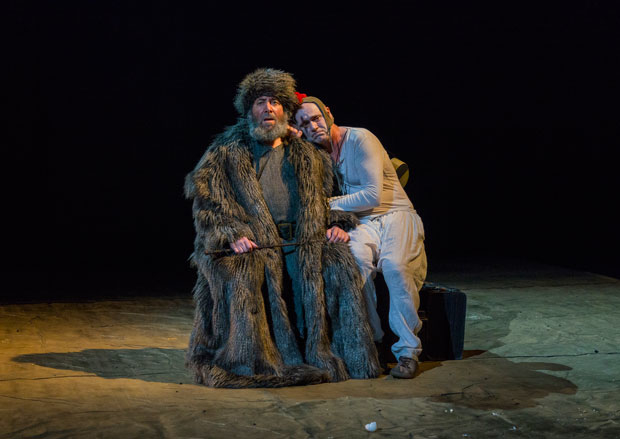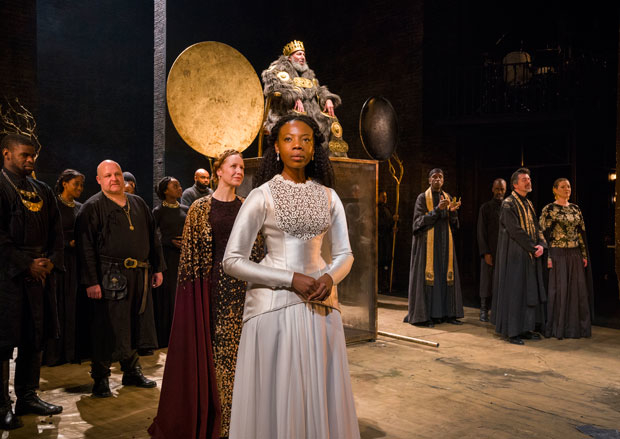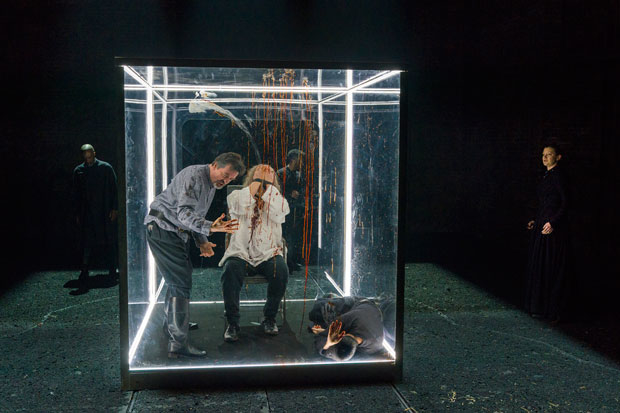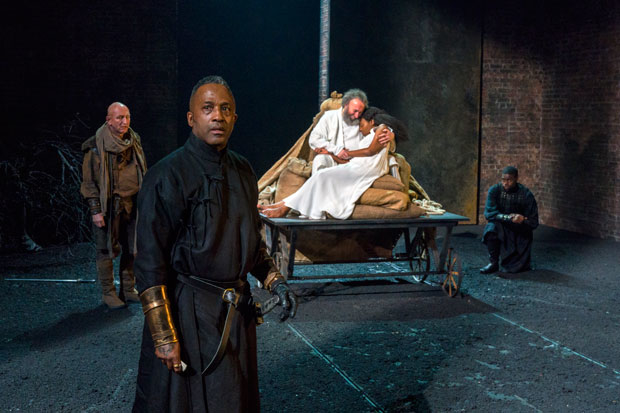Madmen and Fools Rail Against the Universe in RSC's King Lear
Antony Sher makes the tragic monarch the last of his Shakespearean roles.

(© Richard Termine/BAM)
Seven black mounds populate the otherwise barren stage at the beginning of the Royal Shakespeare Company's latest production of King Lear, now running at BAM's Harvey Theater. It takes only a moment to realize that they are cloaked people huddling on the ground and not clods of earth, but the image sets the Beckettian tone for this at times galvanizing, other times frustrating staging of Shakespeare's mortality-themed masterpiece. Antony Sher makes his final Shakespearean performance as Lear, a king driven mad by betrayal and the universal chaos he has been blind to all his life. Despite an excellent cast, it's really Sher's forceful presence and exquisite comedic timing that buoys the production when it seems in danger of foundering under Gregory Doran's inspired but incongruous direction.
Doran remains largely faithful to the original text, setting this Lear in a bleak, early medieval time. The aged, prideful Lear, wearing a heavy fur while carried in on a Popemobile-like throne, tells his court that he will divide his kingdom among his three daughters in order to enjoy what's left of his life. Goneril (a volatile Nia Gwynne), his eldest, expresses her excessive devotion to him, as does Regan (an icy Kelly Williams), and both are awarded sizable portions of the kingdom. Youngest daughter Cordelia (Mimi Ndiweni, the image of faithfulness and honesty), however, fails to match her sisters' ingratiating speeches of love, and incurs her father's wrath. The Earl of Kent (Antony Byrne in a fiery performance) protests the king's denunciation of Cordelia, and Lear banishes him. Rejected by other suitors, Cordelia finds a noble husband in the king of France (a stately Buom Tihngang), who bears her away from England.

(© Richard Termine/BAM)
Soon after, the Earl of Gloucester (a riveting David Troughton) is duped by his illegitimate son Edmund (a wonderfully sardonic performance by Paapa Essiedu) into believing that his other son Edgar (Oliver Johnstone, especially impressive in his mad scene) has conspired in his father's death. Edgar flees into the wilderness, where he pretends to be a mad beggar. Meanwhile, Goneril and Regan strip Lear of his men and all his power, and in a fury, he goes out into a raging storm with his fool (a droll but depressing Graham Turner) and Kent, who has altered his appearance to serve Lear. When Gloucester offers Lear assistance, Regan has her husband (a vicious James Clyde) pluck out Gloucester's eyes. Treachery begets treachery, pitting sister against sister and child against parent, so that nothing, not even the return of honest and loving Cordelia from France, can prevent Lear's family from destruction.
Doran elegantly sets the brutally naturalistic tone of his production in the opening scenes, with attendants carrying thin, barren-tree staffs that recall a Druid procession and with actors clothed in earth-toned, Game of Thrones-style furs, dresses, and battle gear (Niki Turner designed the stark yet arresting set and costumes). This Lear draws its powerful imagery from nature and its violent elements, which Lear himself invokes when he raises his arms to invoke a curse from the heavens on Goneril. He's a man so full of overweening pride that he believes the universe actually operates according to his wishes. Doran augments Lear's imprecations with Ilona Sekacz's ominous music, which takes us into the self-delusionary realm of Lear's hubris.

(© Richard Termine/BAM)
Had this simple but captivating aesthetic remained consistent throughout, the production would have been tremendously affecting. But Doran strays from this vision with the disappointingly static storm scene, in which Sher and Turner are wheeled in through a tall, menacing doorway on top of a huge glass cube while thunder and lightning (sound by Jonathan Ruddick and lighting by Tim Mitchell) fill the stage, and a projection of heavily falling rain plays behind them. That scene should be full of sound and fury, but instead we watch Lear deliver his speech nearly motionless while his fool cringes beside him. This large cube returns for Gloucester's blinding, to gratuitously gory effect. Despite Gloucester's screams of agony, the scene, one of the play's horrors, becomes one of this production's sight gags.
Fortunately, Sher's scenes get the show back on track. His humor and consummate ease with Shakespeare's language still make this production a must-see. Also noteworthy are the rising stars among its ranks, especially Essiedu, who will take on the title role in RSC's Hamlet next month at the Kennedy Center. His duel with Johnstone in the play's last act (fights by Bret Yount and movement by Michael Ashcroft) livens things up near the end of the play's three hours and 15 minutes. And in the moving final moments, Sher and Ndiweni share a pitiable scene as Lear fitfully tries to revive Cordelia, and then quietly gives up the ghost. As this stage legend says goodbye to Shakespeare, we're grateful that he took on the mad king as his final role — we can always hope he'll reconsider.

(© Richard Termine/BAM)









